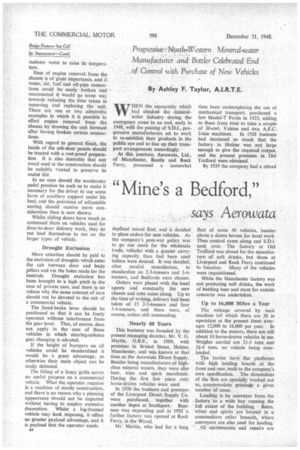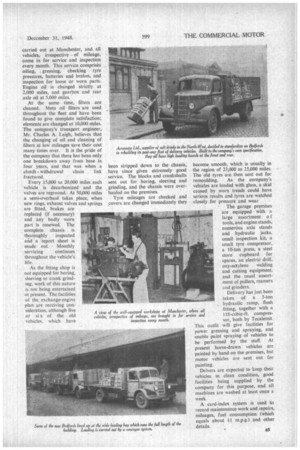"Mine's a Bedford,"
Page 38

Page 39

If you've noticed an error in this article please click here to report it so we can fix it.
says Aerowata
Progressive -North-Western Mineral-water Manufacturer and Bottler Celebrated End of Control with Purchase of New Vehicles By Ashley F. Taylor, A.I.R.T.E.
HEN the anonymity which had cloaked the mineralwaier industry during the emergency came to an end, early in 1948, with the passing of S.D.!., progressive _manufacturers set to work to re-establish their products in the public eye and to line up their transport arrangements accordingly.
At this juncture, Aerowata, Ltd., of Manchester, Bootle and Rock Ferry, possessed a somewhat depleted mixed fleet, and it decided to place orders for new vehicles. As the company's post-war policy was to go out more for the wholesale trade, vehicles with a greater carrying capacity than had been used before were desired. It was decided, after careful consultation, to standardize on 2-3-tonners and 3-4tonners, and Bedfords were chosen.
Orders were placed with the local agents and eventually the new chassis and cabs came along. Up to the time of writing, delivery had been taken of 15 2-3-tonners and four 3-4-tormers, and there were, of course, orders still outstanding.
Nearly 40 Years This business was founded by the present managing director, Mr. V. G. Martin, 0.B.E., in 1909, with premises in Bristol Street, Hulme, Manchester, and was known at that time as the Aerowata Direct Supply. Besides being manufacturers of highclass mineral waters, they were also beer, wine and spirit merchants. During the first few years only horse-driwn vehicles were used.
In 1920 the business and premises of the Liverpool Direct Supply Co. were purchased, together with another depot at Southport. Business was expanding and in 1921 a further factory was opened at Rock Ferry, in the Wirral.
Mr.' Martin, who had for a long time been contemplating the use of mechanical transport, purchased a few Model-T Fords in 1923, adding to these from time to time a. couple of 30-cwt. Vulcan and two A.E.C.
2-ton machines. In 1928 business had increased so much that the factory in Hulme was not large enough to give the required output, and the present premises in Old Trafford were obtained.
By 1939 the company had a rrtixed _fleet of some 40 vehicles, besides about a dozen horses for local work. Then control came along and SDI took over. The factory at Old Trafford was closed for the manufacture of soft drinks, but those at Liverpool and Rock Ferry continued to function. Many of the vehicles were requisitioned.
While the Manchester factory was not producing soft drinks, the work of bottling beer and stout for outside concerns was undertaken.
Up to 16,000 Miles a Year The mileage covered by each machine (of which there are 30 in operation at the present time) averages 12,000 to 16,000 per year. In addition to the motors, there are still about 10 horse-drawn vehicles in use. Weights carried are 21-3 tons and 314 tons, no vehicle being overloaded.
The lorries have flat platforms with high loading boards at the front and rear, built to the company's own specification. The dimensions of the flats are specially worked out to, accommodate preciseky a given number Of cases.
Loading is by conveyor from the . factory to a wide bay running the full extent of the building. Beers, Wines and spirits are housed in a commodious cellar beneath, where conveyors are also used for loading. All maintenance and repairs are carried out at Manchester, and all vehicles, irrespective of mileage, come in for service and inspection every month. This service comprises oiling, i greasing, checking tyre pressures, batteries and brakes, and inspection for loose or worn parts. Engine oil is changed strictly at 2,000 miles, and gearbox and rear axle oil at 5,000 miles.'
At the same time, filters are cleaned. Meta oil filters are used throughout the fleet and have been found to give complete satisfaction; elements are changed at 10,000 miles. The company's transport engineer, Mr. Charles A. Leigh, believes that the changing of oil and cleaning of filters at low mileages save their cost many times over. It is the pride of the company that there has been only one breakdown away from base in four years, and that was when a clutch withdrawal chain link fractured.
Every 15,000 to 20,000 miles each vehicle is decarbonized and the valves are reground. At 50,000 miles a semi-overhaul takes place, when new rings, exhaust valves and springs are fitted, brakes are replaced (if necessary) and any badly worn part is renewed. The complete chassis is thoroughly inspected and a 'report sheet is made out. Monthly servicing continues throughout the vehicle's life.
As the fitting shop is not equipped for boring, sleeving or crank grinding, work of this nature is not being entertained at present. The facilities of the-exchange-engine plan are receiving consideration, although five or si x of the old vehicles, which have
been stripped down to the chassis, have since given extremely good service. The blocks and crankshafts sent out for boring, sleeving and grinding, and the chassis were overhauled on the premises.
Tyre mileages are checked and ,covers are changed immediately they become smooth, which is usually in the region of 23,000 to 25,000 miles. The old tyres are then sent out for remoulding. As the company's vehicles are loaded with glass, a skid caused by worn treads could have serious results and tyres are watched closely for pressure and wear The garage premises are equipped with a large assortment o f tools, and engine stands, numerOus axle stands and hydraulic jacks, small inspection kit, a small tyre compressor, a 10-ton press, a steel store cupboard for spares, an electric drill, oxy-actylene welding and cutting equipment, and the usual assortment of pullers, reamers and grinders.
Delivery has just been taken of a 5-ton hydraulic ramp, flush fitting, together with a 118-ctibic-ft. compressor, both by Tecalemit. This outfit will give facilities for power greasing and spraying, and enable paint spraying of vehicles to be performed by the staff. At present horse-drawn vehicles are painted by hand on the premises, but motor vehicles are sent out for painting. • Drivers are expected to keep their vehicles in clean condition, good facilities being supplied by the company for this purpose, and all machines are washed at least once a week.
A card-index system is used to record maintenance work and repairs, mileages, fuel consumption (which equals about 11 m.p.g.) and other details.




























































































